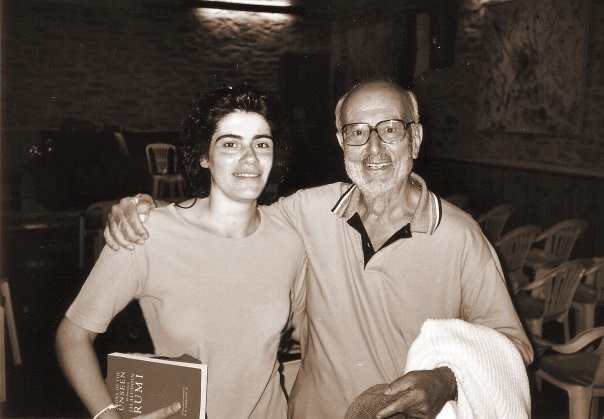SMARO GREGORIADOU MASTER CLASS SERIES
INCLUSIVE INTERPRETATION & FUNCTIONAL TECHNIQUE
'Unlearning' as the most significant way to learn!
This is the title of a series of solo and ensemble classical music workshops that I give worldwide. It expresses my overall teaching methodology after a long experience in observing and expanding my own and my students' musical potential. I am eternally grateful to all my teachers and especially George Hadjinikos (1923-2015) for sharing so generously his wisdom on the mystery of musical interpretation and for ushering me in the idea of 'unlearning' as a significant way to learn!

With George Hadjinikos, summer 1994? in Horto festival, South Pelion, Greece
Inclusive Interpretation & Functional Technique Series: Necessity & Purpose
• What is an “inclusive” interpretation?
• How does an inclusive interpretation vitally embody and organically connect our fundamental expressive powers (breath/voice, gesture/movement) with all musical components that we usually learn separately and unconnected with each other (harmony, polyphony, morphology, sonority, historic identity?)
• What do we mean by “functional technique” and how do we develop it physically?
Inclusive Interpretation & Functional Technique Master-class Series is not aimed exclusively at guitarists. It tries to prompt to the right questions on fundamental problems of technique and interpretation that all instrumentalists or singers encounter in the course of their careers. Such issues involve:
• Historical, morphological, energetic identity of the musical work
• Classical guitar sonority
• Right body posture
• Hours and ways of effective study
• Dynamic cognitive functions, like memory and memorization
• Productive preparation of a program
• Self-confidence on stage
How & why do we study Bach?
How and why do we study Bach? Why do we play his music so extensively in exams and on stage? Why an indifferent performance of baroque music and especially Bach unveils a musician’s shortcomings so badly? In case of the modern classical guitar, an instrument not known in the baroque era, how can we achieve any sort of historical continuity and style consistency?
Yes, the interpretation of such a genre undoubtedly presupposes knowledge in many levels: compositional/historical, technical/empirical, cognitive, aesthetical, etc. What is nevertheless the connective tissue of all these? How can an interpreter perceive the unstated energetic background of the musical work, its energy alternations, natural principles and laws (like the omnipresent “hold-release” principle) that Bach eloquently incorporates in all his works, from the modest minuet to the Passions! Finally, how do we create a fresh, IN VIVO interpretation, an engaging real-time fermentation and mutual interaction, as opposed to the ready-made, repellent, dead executions of quavers and semi-quavers that we hear oftentimes! These are among the main questions we try to answer in the “INCLUSIVE INTERPRETATION – FUNCTIONAL TECHNIQUE” workshop.